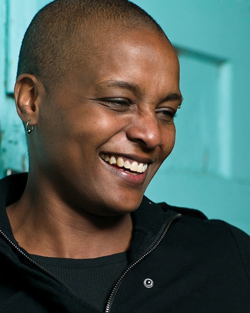
An interview with Dawn Lundy Martin by Noah Eli Gordon

An interview with Dawn Lundy Martin by Noah Eli Gordon
This interview was conducted via email during 2009. It originally appeared in Denver Quarterly 44.4.
Noah Eli Gordon: Around 2002 or so, while we were both in graduate school at UMass Amherst, you said something in passing that stuck with me. I’d asked about your dissertation, specifically about your writing on Nathaniel Mackey, and you jokingly replied that you were writing on his work without looking up all the references. Of course, it’s wholly unfair to bring up some tangential, off-hand remark from a half dozen years ago, especially one which was—I’m sure—a sly half-truth, and yet in reading your recent book, A Gathering of Matter/A Matter of Gathering, I couldn’t help but think about this idea of reference, specifically in relation to your use of a kind of slippery, amorphous deployment of pronouns and action. I get the clear sense in your work of the aftermath of events, their emotional resonance, but also the sense of what’s missing: “Things are forgotten./ Become unknown. Absent as in synapsed void.” Would you talk about this simultaneous opacity and clarity?
Dawn Lundy Martin: To clarify, at the time, I was writing about Mackey without looking up any of the references. I wanted to see what I might get out of Mackey's work without treating it like an academic "text" so directly. I wanted to approach it sidewise, to linger about the language as much as possible to see what it might yield for me that way. Eric Baus was at Umass at the time too, and at your suggestion, I ended up obtaining from him, a copy of a CD of Mackey reading from "Strick: Song of the Andoumboulou 16-25" where he's accompanied by musicians playing flutes, reeds, and percussion, I believe. I listened to this CD everywhere I went, in my headphones, in my car stereo while driving to campus, in my living room while vacuuming, and of course, while writing whatever—my own poems, academic essays for class, etc. This was crucial to my reading of Mackey, which I began to think of as impossible without some attempt to "read" the sounds of the text, to make this reading inseparable from how one might understand and approach any "sounding"—be it music or noise, or some combination thereof. So I absolutely wasn't telling a half truth, especially since I ended up not including Mackey's work in my dissertation. The dissertation is a project that doesn't allow—in most cases—for a reading that fails to take into account other readings or all schools of thought about an author, as the dissertation in itself is a kind of exam in many literature departments, a kind of carving out of your own thinking in and against other thinkers, etc. But, once I was liberated from reading and listening to Mackey's work in this setting, it began to influence even more than it had before my poetic engagement and, interestingly, my teaching.
My own work resists "understanding" as much as it invites "understanding." There are missing "events" because there are events that cannot be spoken, that resist language in the first place or butt up against language in such a way as to affect it, to leave only the resonances of what might be said in a more sayable case. In my dissertation, I end up calling this tension between language's limits and the need or desire to speak, Traumatic Language. When language fails, when it cannot say what needs to be said, what are you left with? What do you do, poet? Clarity qua clarity in the case of A Gathering of Matter / A Matter of Gathering is impossible. Those silences or "what's missing," as you call it, Noah, are what push against the possibilities of utterance. When moments of "clarity" occur they do so by happenstance, by a circling so close around and around a thing, you touch it, as if by accident. But those "accidents" couldn't happen without constant circling, what Myung Mi Kim calls the "approach." There are things then that cannot be said that must be said that cannot be said. (I think I’m paraphrasing from NourbesSe Philip’s Zong! here.) This is the primarily problematic at the center of my first book. Mackey's work inspires because I can think about the language of sound in reaction to this problematic—four (at least) dimensional words and series of words—visual, connotative, denotative, and sonic—and the poem as an attempt to un-reconcile any perceived wholeness and to produce works that illuminate and find productive tensions between ways of speaking and knowing.